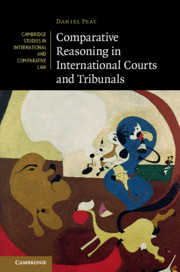Book contents
- Comparative Reasoning in International Courts and Tribunals
- Cambridge Studies in International and Comparative Law: 145
- Comparative Reasoning in International Courts and Tribunals
- Copyright page
- Contents
- Foreword
- Preface
- Table of Cases
- Table of Treaties
- Abbreviations
- 1 Introduction
- 2 The Limits of the Vienna Convention
- 3 Domestic Law in the Jurisprudence of the International Court of Justice
- 4 The Interpretation of Schedules of Commitments in the WTO
- 5 International Investment Law and the Public Law Analogy
- 6 Consensus Doctrine in the European Court of Human Rights
- 7 Domestic Law and System Building in the ICTY
- 8 Conclusion
- Bibliography
- Index
- Cambridge Studies in International and Comparative Law
4 - The Interpretation of Schedules of Commitments in the WTO
Published online by Cambridge University Press: 24 May 2019
- Comparative Reasoning in International Courts and Tribunals
- Cambridge Studies in International and Comparative Law: 145
- Comparative Reasoning in International Courts and Tribunals
- Copyright page
- Contents
- Foreword
- Preface
- Table of Cases
- Table of Treaties
- Abbreviations
- 1 Introduction
- 2 The Limits of the Vienna Convention
- 3 Domestic Law in the Jurisprudence of the International Court of Justice
- 4 The Interpretation of Schedules of Commitments in the WTO
- 5 International Investment Law and the Public Law Analogy
- 6 Consensus Doctrine in the European Court of Human Rights
- 7 Domestic Law and System Building in the ICTY
- 8 Conclusion
- Bibliography
- Index
- Cambridge Studies in International and Comparative Law
Summary
The Dispute Settlement Mechanism (DSM) of the World Trade Organization (WTO) is the compulsory, binding inter-state adjudicatory system for disputes between member states related to WTO law. The panels and the Appellate Body (AB) that work under the framework of the DSM have gained a reputation for judicious and effective dispute resolution in the international sphere, leading them to be hailed as a guiding light for other international courts and tribunals. Although fact-intensive cases are the norm in the WTO DSM, the legal questions that come before panels and the AB are primarily questions of treaty interpretation and hence hold interest for any study of legal interpretation.3
- Type
- Chapter
- Information
- Comparative Reasoning in International Courts and Tribunals , pp. 83 - 106Publisher: Cambridge University PressPrint publication year: 2019

